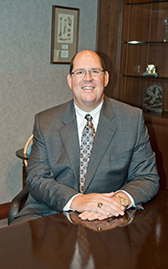Subscriber Benefit
As a subscriber you can listen to articles at work, in the car, or while you work out. Subscribe NowHonoree, Private Companies (revenue $100 million or less)
Most chief financial officers report to a chief executive officer, but William A. Buckles’ chain of command is a bit more unorthodox. His employer, the Indiana Hand to Shoulder Center, treats hand and shoulder issues with a staff of 16 doctors, a central facility in Indianapolis and six satellite central Indiana offices that together treat approximately 25,000 patients annually. In 2008 the group changed its management structure, vacating the CEO position and making an elected physician managing partner.
These days Buckles works shoulder-to-shoulder with that partner, helping to oversee the practice—a change in responsibility that he’s executed seamlessly, and without increasing the size of his department staff. As lead member of the corporate operations group, which handles day-to-day corporate activity (a leadership position he assumed in the absence of a designated CEO), he is the IHTSC’s staff representative on the company’s executive committee and serves as the managing partner’s representative with all outside business contacts.
 (IBJ photo/ Eric Learned)
(IBJ photo/ Eric Learned)Age: 52
Family: Wife Sharon; sons Alex, 26, and Ethan, 22
Hometown: Lafayette, Ind.
Education: bachelor's degree in accounting, Ball State University; CPA
Civic Involvement: Current chairman of the board for West Deanery Unified Catholic Schools
Hobbies: Golf, sports and family travel
It’s just the latest in a respectable list of achievements during Buckles’ 13 years with the group—years that, according to Indiana Hand to Shoulder Center staff, were marked by careful control of overhead that led to solid and sustained financial success. Upon his arrival in 1999, Buckles reorganized the company’s accounting practices and business office functions.
“Many medical practices have had short runs of success and then fallen upon hard times,” said group president Dr. William B. Kleinman. “The Indiana Hand to Shoulder Center has been fortunate to have Mr. Buckles help steer the group through the many challenges in health care economics.”
Buckles also worked with the Center’s owner-physicians to modify the company’s compensation arrangements and has re-structured and continues to maintain the company’s third-party reimbursement contracts for all physician services. In addition, he was instrumental in converting the Center’s 401(k) plan from a trustee-driven model to an employee self-directed plan in 2010, dropping the cost to participants by more than 75 basis points.
He also helped his employer and its patients navigate the economic downturn. Operating costs were controlled or decreased, and clients received help in coping with health care cost increases. For instance, surgery patients got estimates of their out-of-pocket expenses, then advice from the Center’s financial counselors on how to pay.
Under Buckles’ leadership, during 2012 the Center decreased operating expenses compared to 2011, while increasing the number of patients treated. However the CFO also wrestled with far more intractable issues than simply jibing accounts payable with accounts receivable.
“The biggest challenge for all health care administrators in 2012 was to understand how the new regulations from the federal government will be implemented,” he said. “Many private physician practices were integrated into hospital systems … Strategic planning to remain an independent physician practice has been a high priority for the Indiana Hand to Shoulder Center.”
He expects more of the same in 2013. “Changes in federal health care regulations will shape our industry,” he said.•
___
Please enable JavaScript to view this content.
